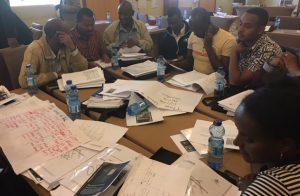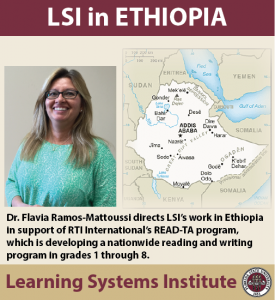USAID publishes online elements of LSI’s work in Ethiopia

seven modules, or textbook chapters,
developed by LSI’s team working in
collaboration with Ethiopian education experts.
The Learning Systems Institute’s work in support of the READ TA project in Ethiopia is now available online from the U.S. Agency for International Development.
The documents are on the USAID’s Development Experience Clearinghouse, a repository of technical reports and other publications produced with USAID funding. USAID is the lead U.S. agency that works to end extreme poverty and to support democratic societies around the world.
READ TA — Reading for Ethiopia’s Achievement Developed Technical Assistance — is a five-year project supported by USAID and implemented by RTI International and its partners, including Florida State University’s Learning Systems Institute.
LSI supports READ TA and the Ethiopian Ministry of Education in its efforts to develop a nationwide reading and writing program in grades 1 through 8. The project is expected to reach 15 million children in all schools and all regions of Ethiopia.
USAID has placed several documents created by LSI’s team in Ethiopia of its Development Experience Clearinghouse, including:
 Baseline Assessment of Pre-Service Teacher Education Programs at Colleges of Teacher Education in Ethiopia. http://pdf.usaid.gov/pdf_docs/pa00mhtb.pdf.
Baseline Assessment of Pre-Service Teacher Education Programs at Colleges of Teacher Education in Ethiopia. http://pdf.usaid.gov/pdf_docs/pa00mhtb.pdf.
- Cognitive development and literacy skills. Module 1: MT 201(Saba) [Reading for Ethiopia’s Achievement Developed Technical Assistance (READ TA). http://pdf.usaid.gov/pdf_docs/pa00mmcw.pdf.
- Cognitive development and literacy skills Module 1: MT 201 (Latin) [Reading for Ethiopia’s Achievement Developed Technical Assistance (READTA)]RTI International, Florida State University — http://pdf.usaid.gov/pdf_docs/pa00mmcv.pdf.
- Teaching speaking and listening in primary school Module 3: TMT 224[Reading for Ethiopia’s Achievement Developed Technical Assistance (READ TA)]RTI International, Florida State University http://pdf.usaid.gov/pdf_docs/pa00mmcz.pdf.
“We have been working in Ethiopia since 2013,” said Flavia Ramos-Mattoussi, Ed.D., Senior Research Associate at the Learning Systems Institute and Principal Investigator/Project Manager on FSU’s role in the READ-TA project. “First, trying to understand the context surrounding students, teachers, and those institutions responsible for producing the teachers of the future. We came to Ethiopia with a team of teacher educators and specialists in reading/literacy. Our task was to reform the pre-service teacher education system, including 36 Colleges of Teacher Education, develop course content and textbooks, and train the teacher educators to apply the new methods and materials in alignment with the primary school curriculum. Not a simple task, to say the least.”
Nearly five years later, LSI’s has trained 250 teacher educators and produced seven modules for the pre-service teacher education program nationwide.
“The FSU team worked very closely with the local people, educators and policymakers, who made sure what has been produced is relevant and culturally and linguistically appropriate to teachers and students alike,” Ramos-Mattoussi said. “And we did all this is seven national languages.”
Ramos-Mattoussi, who returns to Ethiopia next week, said she was pleased that educators worldwide now have access to the RTI International/FSU documents.
“I’m very happy when I see some of the work we did in Ethiopia, under the READ TA project implemented by RTI international, now made publicly accessible on DEC,” she said.
To see all READ-TA documents posted by USAID, visit https://decsearch.usaid.gov/ and search “READ TA.”
Read more about LSI’s work in Ethiopia here.
